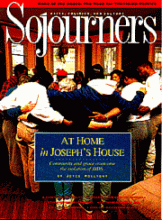A Place That Is Home
Around Joseph's House, they call Howard Janifer's room "The Icehouse." The room is as frigid on this late-January afternoon in Washington, D.C., as the outdoors. Howard explains that he's used to the cold from his time on the streets. When asked how many years he lived there, he says, "A whole lotta winters--over 17."
But the room exudes the warmth of a place that is home. A small altar at the foot of the bed holds a statue of Jesus, several rosaries, and a well-worn Bible, unusual for the thin, steel spike taped inside. Around the room are homemade candles, a walking stick Howard found on the beach, and his certificate of baptism, dated October 13, 1991.
He picks up a picture of his daughters from among the many he has stuck to a mirror. "If it weren't for this place," he says, referring to Joseph's House, "I wouldn't have seen my kids." Until last June, it had been 21 years since Howard had seen them. He explains that he never had a home to invite them to before.
He opens his Bible and begins to tell the story of the spike taped there. Some years ago Howard fell off a roof and shattered his foot while trying to get through a skylight for a place to sleep. He spent more than three hours in an ambulance while four hospitals refused him care because he lacked health insurance. A doctor at D.C. General Hospital who saw him took a paper bag, filled it with pencils, shook it up and said, "That's what your foot looks like." The spike was drilled into his ankle for six months of traction.
Read the Full Article

